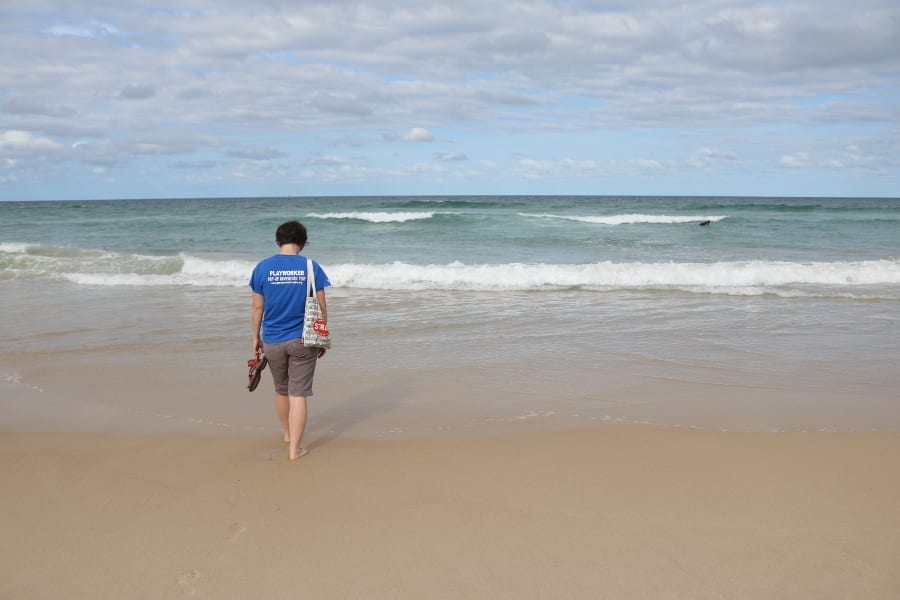There are some questions we’ve asked a thousand times.
- “What is play?”
- Moreover: “What did you love, when you were a child?”
- “What do you do for fun, these days?”
It’s part of our warm-up routine, when standing in front of teachers, childcare professionals, parents and anyone else interested in play or playwork.
The last question often meets with awkward silence. Suzanna and I might prompt them. Who sings along with the car radio? Who reads ‘trashy’ novels (whatever that means for you)? Sometimes I’ll start listing characteristics to see what sparks.
“What might feel silly, but you really enjoy doing it? What do you really want to do, even when it’s not productive?”
People often struggle to identify their activities as play, or to remember when they played last. Eventually they begin to admit, giggling and shy, I make ornamental birds out of sticks. Colleagues might look at one another, surprised by sudden revelations. I take long hikes with my dog. I bake with my grandchildren. One person’s joy can be another person’s chore, whether it’s playing soccer or gardening.
It’s beautiful to see the number of ways people find to access that feeling, to identify the place within us which resonates when we see someone else talking about what they love. It’s powerful to see how often people say that they can’t find the time, or that they tried an old favourite after a long absence and it didn’t feel the same. Many fellow play nerds have mused with us, What is play anyway? Am I even playing? How do I stop worrying I’m doing it wrong?
In those workshops, when I’m gently nudging people to admitting things they enjoy, I wonder to myself if this will be the time that someone says “I have sex”. Is anyone else thinking it? Once in California, a back row of male Parks and Rec staff burst into giggles, but refused to speak when I called on them. Another time, I mentioned it as a possibility and the room burst into shocked laughter. We didn’t actually talk about sex (which is fine, the topic was ‘Outdoor Options for Under-5s’) but it definitely broke the ice.
That’s what we’re hoping to do here with a new short course, simply called “Adult Play.”
We’ll be sharing key concepts that have changed the way we think about adult needs for play, how we express (and repress!) ourselves, and the risks people take to live wholeheartedly. I promise that these calls will offer useful resources, direct support for reflective practice, and a sense of community. Our course will be 3 x 1 hour live online sessions starting in June using apps like Zoom or similar. We’re keeping it ‘intimate’, with a max of 10 participants – we already have 3 sign ups and are waiting for 3 more so we can announce a date and timezone that can work for everyone.
Playing in adulthood can be hard! Even in ‘a good year’, we might legitimately be pushed for time, overwhelmed, isolated or simply weary at heart. And this is not that year! We know how hard it can be to keep the promises we make to ourselves amidst the chaos, pressures and fear.
We play advocates also know, more than most, the difference that real and regular play can make in a person’s life, and how fear can hold us back. Who doesn’t want those feelings of joy, bravery, humour, release? Who doesn’t want to reconnect with that feeling of Best Day Ever, and live this life while we can? If you need a ‘selfless’ reason, remember how it also helps us be bright, compassionate, present and patient with those we love and care for.
Only one more question in this. Okay, it’s in two parts!
1. How much time/passion/resources/etc have you dedicated to children playing?
2. What might happen, if you dedicated a percentage of that to play in your own life?
Suzanna and I definitely don’t know the answers to these, but we hope you’ll join us for the conversation.
Email suzanna@popupadventureplay.org if you’d like to find out more about the course, but if you’re already sold, pay for your spot here right now and you’ll receive a free printable.
EDIT: We were super pleased to have 5 folks join us for the first version of our Adult Play Course in June/July 2020. There were three sessions which spanned 4 weeks, and feedback has been great! We are hoping to run this course regularly in the future so please get in touch if you are interested!

One of our most favourite things to do – wandering around beaches, taking in the atmosphere and acquiring little souvenirs.
By Morgan